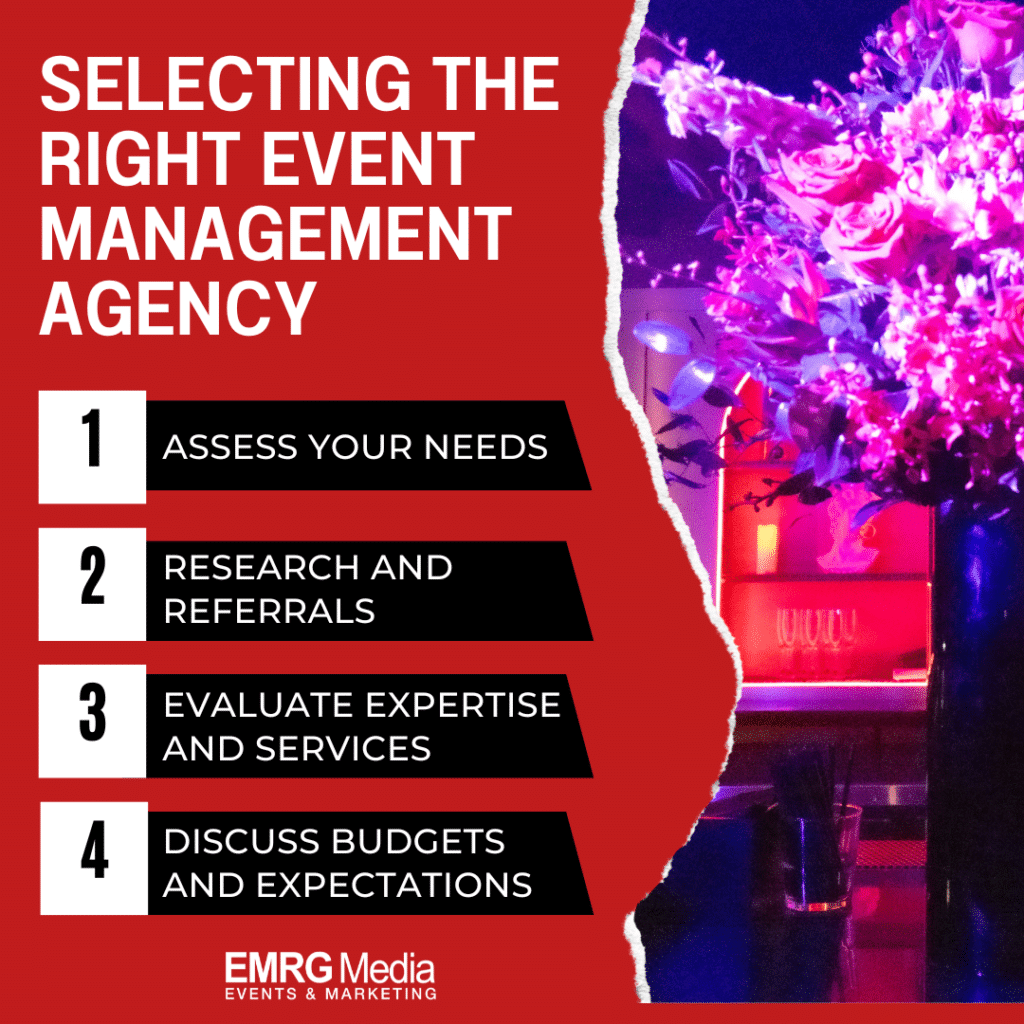Event management agencies, the unsung heroes behind the scenes, are crucial in turning imaginative visions into memorable experiences. This article offers insights into the distinctive functions of an event management agency and how they set themselves apart from other planning services.
We’ll explore top agencies’ wide range of services, from organizing significant corporate events to intimate social gatherings.
Finding the right event management agency can seem overwhelming, but our guide will provide essential tips to choose one that aligns with your event’s essence.
We’ll also delve into how technology revolutionizes event organization and share real success stories from the field.
Understand the changing trends shaping the future of our industry and learn how to effectively collaborate with an event management agency to bring your dream event to life.
Finally, weigh the pros and cons of DIY planning versus partnering with professional experts for your events.
Ready to turn your event vision into a reality? Contact EMRG Media and let our team of experts guide you through a seamless and unforgettable event planning experience in New York City.
Table Of Contents:
- Understanding Event Management Agencies
- Key Services Offered by Top Event Management Agencies
- Selecting the Right Event Management Agency
- The Role of Technology in Modern Event Management
- Trends Shaping the Future of Event Management Agencies
- How to Work Effectively with Your Event Management Agency
- Comparing Costs – DIY vs. Hiring an Event Management Agency
- FAQs about Event Management Agency
- Finding the Right Event Management Agency
Understanding Event Management Agencies
Event management agencies specialize in the planning and execution of events, offering services that range from conceptualization to post-event analysis.
To create memorable and effective event production, these agencies work with various clients, including corporations, non-profits, and government organizations.
Understanding the scope of services offered by these agencies is crucial. They can manage logistics, secure venues, coordinate with vendors, handle marketing efforts, and ensure the event runs smoothly.
Recognizing the expertise and resources that a competent event management agency brings can significantly impact your event’s success.
Key Services Offered by Top Event Management Agencies
Comprehensive Planning and Coordination
At the core of any successful event is meticulous planning and coordination. Leading agencies like us at EMRG Media take charge of everything from conceptualization to execution.
Choosing the right spaces that align with an event’s atmosphere and goals, and coordinating suppliers for catering, decor, and entertainment activities, among others, is part of the detailed coordination.
We strive to plan events smoothly so that hosts can fully enjoy their guests’ company, trusting us to handle all the small details.
Innovative Technology Solutions
In today’s digital age, leveraging technology is non-negotiable for enhancing guest experiences, from virtual reality previews of venues to apps facilitating networking among conference attendees.
Leading firms seamlessly integrate advanced technological innovations to elevate their offerings. By employing these innovative resources, events become more engaging and benefit from smoother logistical management.
Versatile Event Types Catering
A mark of event management companies is their ability to cater to various types of events—from corporate galas and product launches to intimate social gatherings and large-scale public festivals.
This versatility ensures that no matter your event type or size, they have the expertise to pull it off without problems. If you’re curious about what kinds of events there are, Social Tables offers some great examples.
Selecting the Right Event Management Agency
Finding the ideal event management agency for your needs may seem difficult. However, with the right strategy, it becomes much more straightforward.
Assess Your Needs
Begin by clearly defining the goals and objectives of your event. Consider the type of event you’re planning, your target audience, and what you aim to achieve.
This will help you identify the services you need from an agency. Knowing the scale of your event, whether local, national, or international, can also dictate the level of support and resources required.
Also, knowing the specific cultural or industry details can help you choose an agency that matches your event’s spirit. It’s crucial to share these requirements with potential agencies to make sure they can meet your expectations.
Research and Referrals
Start with a thorough research process. Look for agencies with experience in managing events similar to yours.
Online reviews and referrals from industry colleagues can provide valuable insights. Don’t underestimate the power of a well-curated portfolio; it can give you a glimpse into the agency’s creativity and execution capabilities.

Social media platforms and professional networks can also be fruitful sources for finding reputable agencies. Ensure you take the time to verify the testimonials and references provided to get a real sense of the agency’s reliability and performance.
Evaluate Expertise and Services
Once you have a shortlist, evaluate each agency’s expertise and range of services. Consider their experience in your industry, their creative approach, and how well they understand your vision.
Look into their track record of managing events with a similar scope and complexity to yours. Assessing their logistical and crisis management skills can also provide confidence in their ability to handle unforeseen challenges.
Furthermore, understanding their network of suppliers and vendors can reveal the potential for cost efficiencies and quality of service. This evaluation will help ensure the agency’s capabilities align with the specific needs of your event.
Discuss Budgets and Expectations
Be upfront about your budget and discuss your expectations. Reputable event planning companies will offer transparent pricing and be honest about what can be achieved within your budget.
It’s essential to have a detailed discussion about the cost implications of your desired services and any additional expenses that may arise. Establishing clear terms of communication and progress updates can also prevent any misunderstandings.
Remember, a successful partnership relies on mutual respect and understanding, so choose an agency willing to work within your financial constraints while striving to exceed your expectations. This approach will foster a collaborative relationship geared towards the success of your event.
The Role of Technology in Modern Event Management
Technology has transformed event management, simplifying complex tasks and opening new opportunities for creativity and engagement. This change is essential for agencies looking to lead in a competitive industry.
Software Solutions Streamlining Operations
Digital tools have revolutionized how events are planned, executed, and analyzed. Platforms like Eventbrite simplify ticket sales and registrations, while project management software such as Asana keeps teams on track with timelines and responsibilities.
Integrating these systems allows for smoother operations, letting event planners focus more on the creative aspects. Analytical software equips organizations with a deeper understanding of participant inclinations and actions, enhancing their ability to tailor experiences.
By using data analytics, we can customize marketing strategies, including experiential marketing tactics, and choose the ideal location for an event, ensuring it resonates well with its intended audience.
Vital Role of Virtual Event Platforms
The surge in virtual events has made platforms like Zoom indispensable parts of an agency’s toolkit. They offer a medium for hosting webinars or meetings and sophisticated engagement features, such as breakout rooms, polls, and Q&A sessions.
Agencies can now establish their presence globally, free from the constraints traditionally imposed by physical locations.
Social Media’s Expanding Influence
Social media serves two main purposes: before an event, it’s a vital tool for promotion, and during the event, it becomes a live broadcasting platform, greatly extending the event’s reach as attendees share it on various networks.
The ability to share instantly, along with features like live polls or hashtags, boosts real-time engagement, both online and in person. Thus, social media effectively connects an event’s digital and physical aspects.
Trends Shaping the Future of Event Management Agencies
Event planning agencies are riding a wave of significant change fueled by technological advancements and evolving expectations. These shifts are fundamentally changing the landscape of event organization.
Integration of Advanced Technologies
In the realm of event organization, there’s a fusion happening with cutting-edge techs like VR, AR, and AI, transforming how experiences are crafted.
These tools not only enhance attendee engagement but also streamline planning processes. For example, VR can give clients a virtual tour of their event setup before it happens, ensuring everything aligns with their vision.
Moreover, AI-powered chatbots provide real-time assistance to attendees, answering questions and offering personalized recommendations. Leveraging cutting-edge technology, agencies distinguish themselves by crafting unforgettable experiences that leave a lasting impression.
Sustainability Practices Gain Priority
Sustainability is no longer optional; it’s imperative. Customers now insist on green gatherings that reduce waste and minimize their carbon trails.
Leading agencies now prioritize sustainability at every stage—from digital invitations to reduce paper use to selecting venues committed to green practices.
This change is not only beneficial for the environment but also appeals to attendees who highly value corporate responsibility. Therefore, adopting eco-friendly practices is crucial in attracting clients.
Inclusive Events Catering to Diverse Audiences
Event organizing now prioritizes embracing various cultures and ensuring everyone feels included. Agencies now emphasize creating events accessible to everyone regardless of physical ability or cultural background.
This includes providing sign language interpreters for hearing-impaired guests or ensuring venue accessibility for those with mobility challenges.
By taking into account various dietary needs and preferences, we show our respect for the diverse backgrounds of all participants. This approach makes everyone feel included and significantly boosts overall satisfaction with the event.
How to Work Effectively with Your Event Management Agency
Building a strong partnership with your event management agency is key to the success of your events. Enhance your collaboration by fostering a healthy relationship.
Selecting the Right Communication Channels
To start, clear communication forms the foundation of any successful collaboration. Discuss and agree on preferred communication channels, emails, phone calls, or project management tools.
By implementing this measure, we safeguard against miscommunications and guarantee prompt replies. Beyond choosing platforms, setting regular check-in meetings helps keep both parties aligned on progress and changes.
Whether weekly or bi-weekly, these touchpoints allow space for feedback and adjustments as needed.
Defining Roles Clearly
An effective partnership also relies on understanding each other’s roles, knowing who is responsible for what, minimizing confusion, and streamlining decision-making processes. It might help to document these roles early in the planning stages for easy reference throughout the project.
This clarity extends to expectations around deadlines and deliverables, too. Being upfront about what’s feasible within given timelines helps manage expectations on both sides.
Leveraging Their Expertise
Your chosen agency brings a wealth of experience—use it. Be open to their suggestions, primarily when they’re based on industry best practices or past successes.
EMRG Media, for example, is known for its innovative approaches that could bring fresh perspectives to traditional event formats. But remember, balance is key. While it’s essential to consider their advice, don’t shy away from expressing your vision.
Your input gives valuable direction, making sure the end result feels true to your brand identity.
Comparing Costs – DIY vs. Hiring an Event Management Agency
Understanding the Financial Commitment
When planning an event, budget is often the first consideration. Doing it yourself might seem like a cost-effective approach at first glance. Hidden costs such as time investment and last-minute emergencies can quickly add up.
Hiring an event management agency, on the other hand, might appear more expensive initially. However, agencies bring value through vendor relationships and bulk pricing that aren’t typically accessible to individuals or companies organizing events independently.
To truly understand the financial commitment of both approaches, consider direct expenses and indirect costs like time and stress.
The Value of Time and Expertise
The saying “time is money” holds especially true in event planning. DIY planners spend countless hours researching vendors, negotiating prices, and managing logistics—tasks that are second nature to professional agencies.
Agencies possess a wealth of knowledge from years of experience, allowing them to anticipate potential issues before they arise. Their knack for streamlining the planning and implementation process often results in cost reductions for those they serve over the long haul.
Making An Informed Decision
Selecting between DIY or hiring an agency comes down to evaluating your specific needs against what each option offers. Consider factors such as event scale, complexity, and personal bandwidth for project management tasks.
FAQs about Event Management Agency
What is the purpose of an event management company?
They’re the pros who make sure your event goes off without a hitch, handling everything from planning to execution.
What is the event agency?
An event agency specializes in creating and running events. They turn visions into reality, ensuring memorable experiences.
How do event agencies make money?
Agencies charge for their expertise in planning and executing events. This might be fees or commissions on services used.
How do I start an event marketing agency?
Kick things off by gaining experience, then build a portfolio. Next up, network like crazy and promote your unique edge.
Finding the Right Event Management Agency
Selecting the ideal event management agency is key to bringing your event vision to life.
Look for a team that resonates with your event’s core values and explore their range of services, from tech support to creative design, to ensure they can cover all bases. Asking detailed questions will help you secure the perfect match.
Technology is essential for efficient event planning and execution, so prioritize agencies that leverage the latest tools. Remember, the right mix of planning and flexibility can make all the difference in overcoming challenges.
The future of event planning emphasizes technology and customization. Choose an agency that’s innovative and adaptable to future trends.
Clear communication and trust in your agency’s expertise are the foundations of a successful partnership. Consider the value of time and peace of mind saved when deciding between DIY and professional planning.
The aim is to simplify the process of creating memorable events. You can achieve just that with the right agency, making every moment unforgettable with minimal hassle.
Contact us today to start crafting your next extraordinary event in NYC. Let EMRG Media create your next unforgettable experience.




